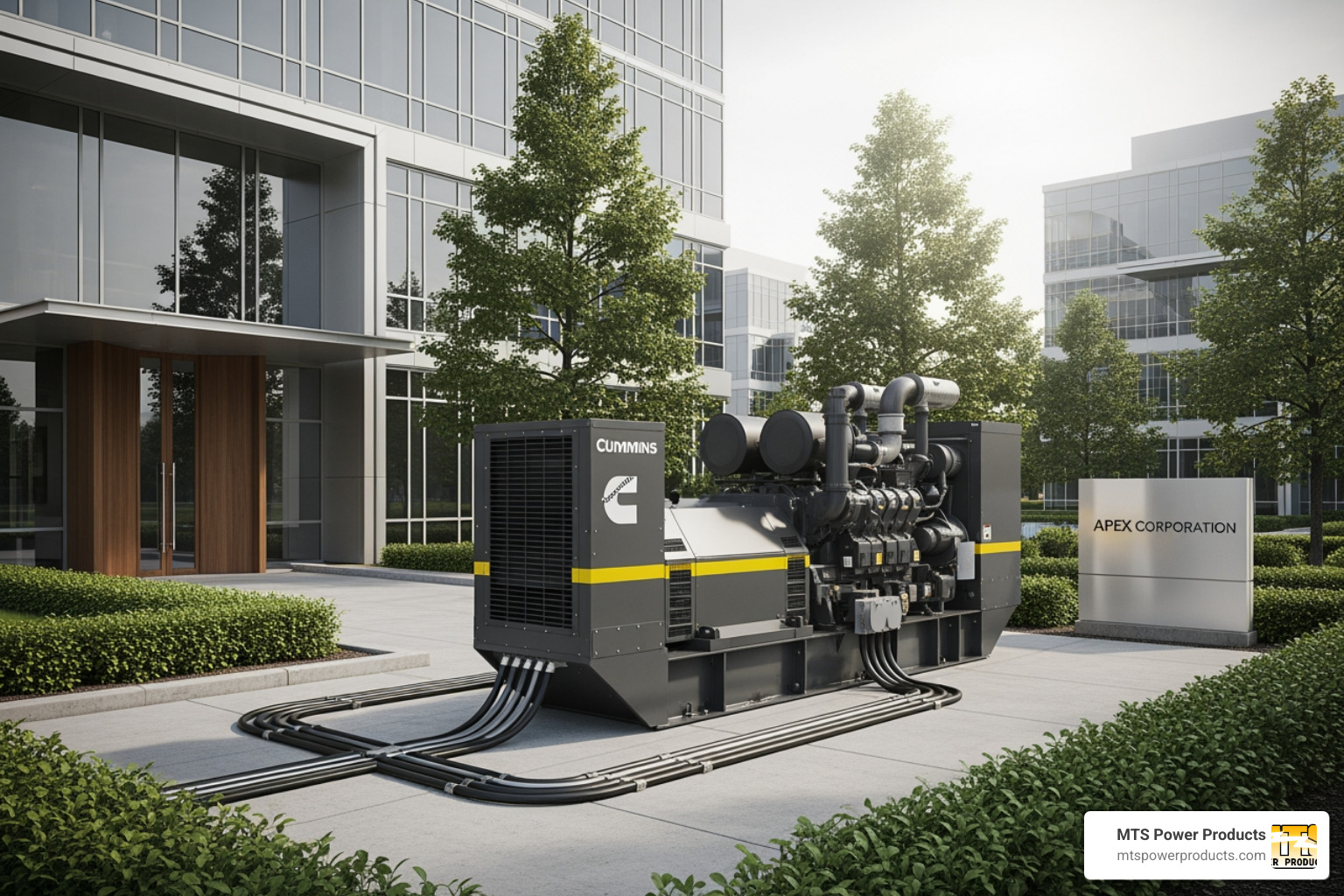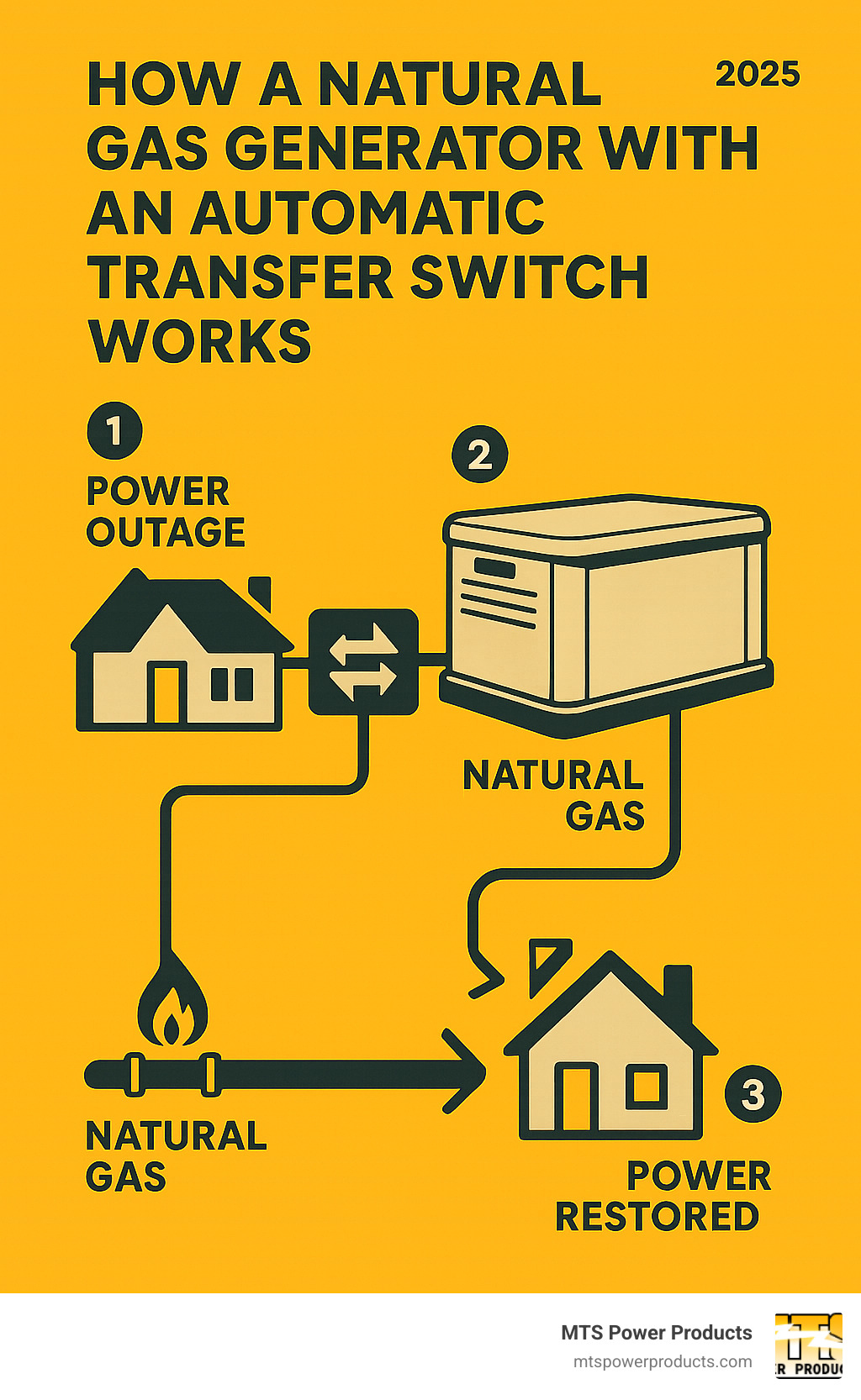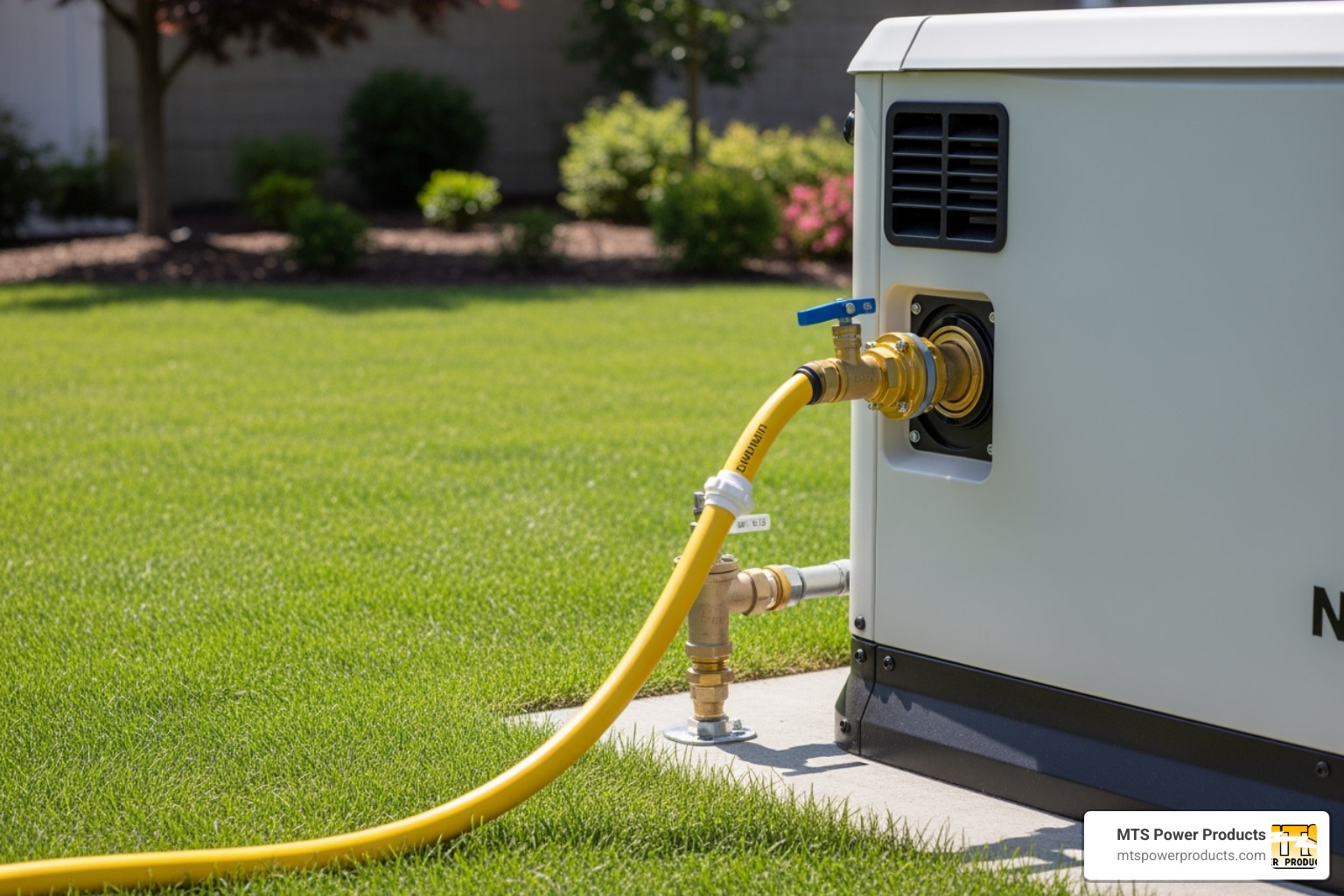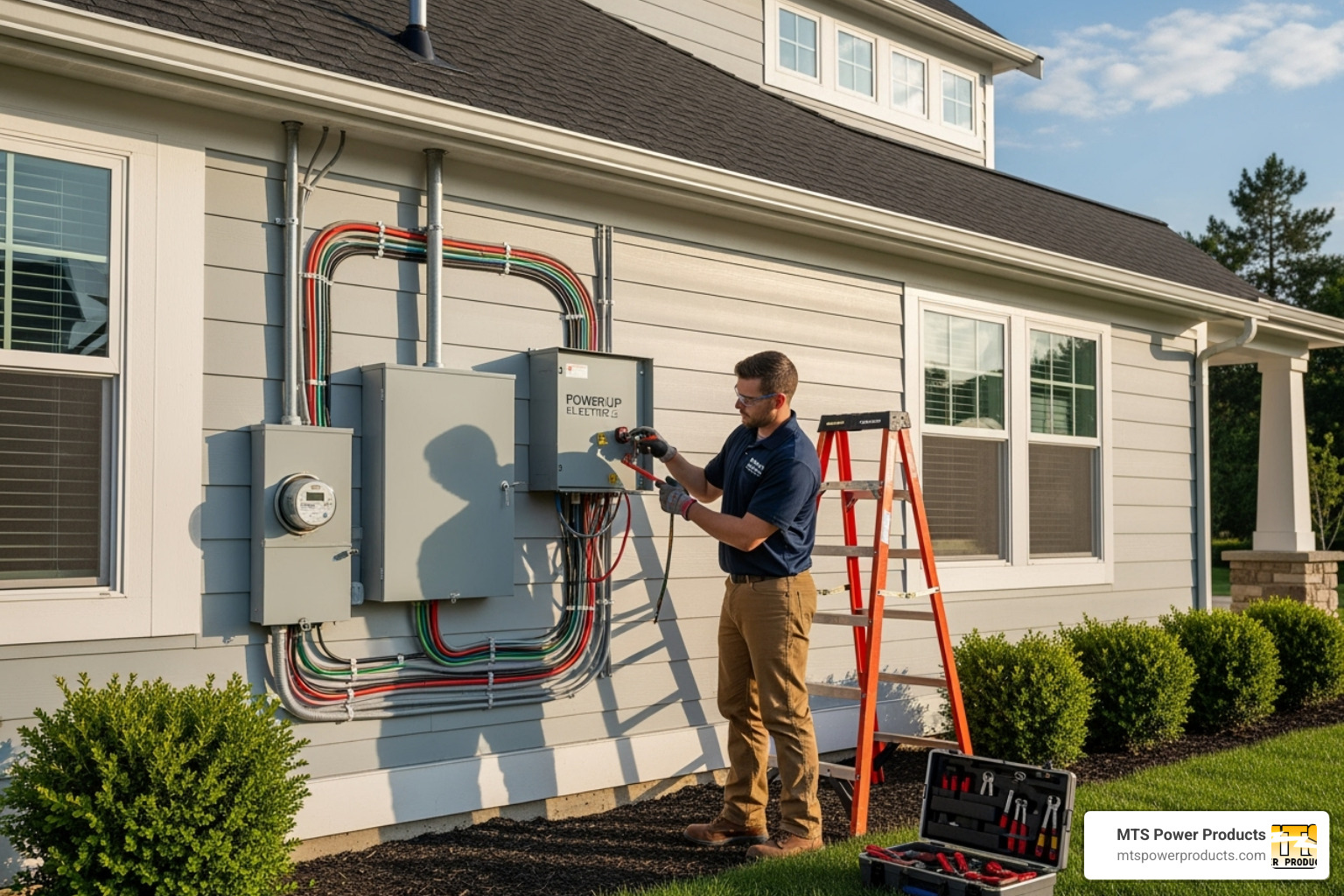
Buy Direct
from the Manufacturer
Sell our Products
Become a Distributor
Discounts
on volume purchases
Visit Us
at our Miami office
from the Manufacturer
Become a Distributor
on volume purchases
at our Miami office
A natural gas whole house generator is a permanent backup power system that connects directly to your home’s natural gas line, providing automatic power during outages.
Power outages can mean spoiled food, uncomfortable temperatures, and safety risks. A whole house generator offers a powerful solution, providing peace of mind during difficult times. This guide will help you understand if this robust backup system is the right choice for your home.

Relevant articles related to natural gas whole house generator:
When we talk about a natural gas whole house generator, we’re referring to a stationary fixture, often called a standby generator. Unlike portable generators, this system is permanently installed outside your home, much like an air conditioning unit. It integrates with your home’s electrical system and connects directly to your existing natural gas line, providing a continuous fuel supply. For a deeper dive into backup solutions, you can explore What is a Backup Generator?. To understand more about the fuel source, click here for information on Natural gas.

The beauty of a natural gas whole house generator lies in its fully automatic operation, orchestrated by an Automatic Transfer Switch (ATS). This intelligent component constantly monitors your utility power. When it detects an outage, the ATS signals the generator to start. Within seconds, the generator is producing electricity. The ATS then safely disconnects your home from the grid and transfers the electrical load to the generator. When utility power is restored, the ATS reverses the process, reconnecting your home to the grid and shutting down the generator. Many modern generators also feature weekly self-test cycles to ensure they are always ready.
The advantages of installing a natural gas whole house generator extend far beyond simply keeping the lights on.
Choosing a natural gas whole house generator is a significant home investment that requires professional installation, proper permitting, and careful planning. Think of it like adding central air conditioning—it involves electrical, gas line, and site preparation work. Once installed correctly, however, it provides decades of reliable backup power.

Getting the size right is crucial. Too small, and it won’t power your essentials; too big, and you’ve overspent. Start by listing the appliances you need during an outage, focusing on must-haves like the refrigerator, HVAC system, and medical equipment. Every appliance has a running wattage (continuous use) and a higher starting wattage (initial surge). For example, a central AC unit might need 4,000 watts to run but 10,000 watts to start.
To estimate your needs, add the running wattages of all items, then add the single highest starting wattage. Remember to convert watts (W) to kilowatts (kW) by dividing by 1,000. It’s wise to add a 20-25% buffer to this total. Most homes are well-served by generators in the 27-36 kW range, but a professional installer will perform a detailed load analysis to determine your exact needs.
A natural gas whole house generator is a major investment. The generator unit itself typically costs between $3,000 and $15,000, depending on size. Installation costs can add another $2,500 to $5,000 or more, covering the concrete pad, gas line connection, electrical work, and the automatic transfer switch. For a typical home, the total installed cost might range from $8,500 to $12,000.
Ongoing costs include the natural gas used during outages and self-tests, plus annual maintenance, which usually runs a few hundred dollars. However, a generator can increase your home’s value, with homeowners often recouping a significant portion of the cost. This return on investment analysis shows how it can pay for itself by preventing costs like spoiled food or hotel stays during a single major outage.
Installing a natural gas whole house generator is not a DIY project and requires licensed professionals. The process begins with a site assessment to find a location that meets local codes and is close to your gas and electrical connections. Next, a foundation, typically a concrete pad, is prepared. Once the generator is placed, a licensed professional connects the fuel line from your home’s natural gas supply. An electrician then installs the automatic transfer switch (ATS) next to your main breaker panel and wires it to the generator. The final step is system testing to ensure everything operates automatically as it should. The entire process requires permits and inspections, which are typically handled by the installer. For more details, see our guide on Natural Gas Generator Installation.
When considering home backup power, a natural gas whole house generator stands out for its reliability and convenience. Let’s see how it compares to other common generator types.
| Feature | Natural Gas Whole House Generator | Propane Generator | Diesel Generator | Portable Gasoline Generator |
|---|---|---|---|---|
| Fuel Source | Direct natural gas line | Stored propane tanks | Stored diesel fuel | Stored gasoline |
| Fuel Availability | Continuous, unlimited supply | Limited by tank size | Limited by tank size | Limited by tank size, degrades fast |
| Refueling | None needed | Manual refilling of tanks | Manual refilling of tanks | Frequent manual refilling |
| On-site Storage | No | Yes, large tanks required | Yes, large tanks required | Yes, small containers |
| Emissions | Lower, cleaner burning | Lower, cleaner burning | Higher, more pollutants | Higher, more pollutants |
| Operating Cost | Generally lower | Moderate | Higher | Highest |
| Noise Level | Designed for quieter operation | Moderate | Louder | Loudest |
| Automation | Fully automatic (with ATS) | Can be automatic (with ATS) | Can be automatic (with ATS) | Manual start/stop only |
| Safety | High (permanent installation) | Moderate (tank handling) | Moderate (fuel storage) | Lower (CO risk, fuel handling) |
Natural gas offers clear benefits as a fuel source. The direct connection to your home’s gas line means a continuous power supply without the hassle of refueling or storing bulky, hazardous tanks on your property. This is a major advantage during extended outages. Natural gas is also a cleaner burning fuel, producing fewer emissions than diesel or gasoline, a benefit recognized by standards like the 1990 Clean Air Act. Finally, it often has lower operating costs, making it a more stable and affordable option for long-term use.
While portable generators are cheaper upfront, they require manual starting, constant refueling, and careful placement to avoid carbon monoxide dangers. A natural gas whole house generator offers a superior experience:
To learn more, check out Choosing the Best Home Backup Generator.
Owning a natural gas whole house generator involves understanding its operational needs, including maintenance, noise, and lifespan. These units are built for durability and designed to provide reliable power for decades.
Like any engine, a generator needs regular maintenance to ensure peak performance. Most units run a brief weekly self-test, often in a quieter, low-RPM mode, to keep components lubricated and ready. Annual professional service is highly recommended and typically includes oil changes, filter replacements, and checks on the spark plugs and starting battery.
Many modern generators feature advanced digital controllers with LCD displays to monitor status and track maintenance intervals. Some also offer remote monitoring via smartphone apps, which can send alerts about maintenance needs or operational issues. This proactive care is vital for reliability. For more on this topic, see Advantages of Natural Gas Home Backup Generator.
Noise and reliability are key considerations for homeowners.
It’s natural to have questions when considering a significant home improvement like a natural gas whole house generator. Here are answers to some of the most common inquiries.
Yes, a properly sized natural gas whole house generator can power your entire home, from lights and refrigerators to central air conditioning. The key is performing an accurate load calculation to ensure the generator can handle the combined power needs of your appliances. Many modern generators also feature smart power management systems that can balance electrical loads, allowing you to power more with a more cost-effective unit. Whether you want to power just the essentials or your whole home, a generator can be sized to fit your needs. Explore more about Whole House Generators.
While homeowners are overwhelmingly satisfied, there are a few considerations. The primary drawback is the initial cost of the unit and professional installation. These systems also require ongoing maintenance, like a car, including annual servicing. They are also dependent on the natural gas utility, which could be interrupted in a rare, catastrophic event. Finally, while much quieter than portable units, they do produce noise, which can be a factor in dense neighborhoods. Despite these points, most owners find the peace of mind and security during an outage far outweigh the considerations.
Yes, in almost all cases, permits are required. Installing a natural gas whole house generator involves significant electrical and gas system work. You will typically need electrical, plumbing/gas, and building permits to ensure the installation is safe and meets all local codes. If you live in a community with a Homeowners Association (HOA), you will likely need their approval as well. A reputable installer will handle the permitting process to ensure your generator is fully compliant, which is especially important in areas with strict codes like Miami, FL.
Is a natural gas whole house generator the right fit for your home? If you value uninterrupted comfort and security during a power outage, the answer is likely yes.
Think of the last power outage you experienced. A generator eliminates worries about spoiled food, uncomfortable temperatures, or disabled security systems. The peace of mind knowing your family will remain safe and comfortable—no matter the weather—is invaluable.
While there is a significant upfront investment, a generator can pay for itself by preventing the costs of a single major outage, such as hotel stays or home damage. It also adds significant value to your property. The automatic, continuous operation provides a level of convenience that portable generators simply cannot match.
At MTS Power Products, we specialize in helping South Florida families achieve energy independence with our custom generators and advanced McPherson Controls. Located in Miami, we understand the importance of preparing for everything from hurricane season to heat waves. Our team can guide you through the entire process, from sizing your generator to final installation.
Ready to take the next step? Let’s talk about how we can keep your lights on when everyone else’s go out.